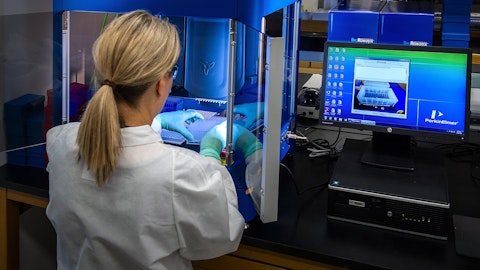Ananda Ghosh: Hi guys. Thanks for giving me time and also, congrats on the quarter. So I have two questions on the ALS program and one for the PSP. The first question is basically some of the question which keeps coming from the industrial community and that would be. If PHOENIX is a required confirmatory study for accelerated approval of RELYVRIO and what — if it says, then can FDA initiate a process to pull it off from the market? So any clarification on that would be great. And then, I have a follow-up question on the ALS program and then, PSP.
Justin Klee: Sure. And thank you for the question, Ananda. And yeah, I mean, first, there is a full FDA approval. There’s no condition of the PHOENIX study. In Canada, it’s an NOC/c which means, a Notice of Compliance with Conditions. And again, our expectation in Europe, if there’s an approval is that it would also be a conditional marketing authorization and the condition there would be PHOENIX. So we continue to run the PHOENIX study. We’ll have those results mid-next year. That’s a very highly powered study. And we and I think the ALS community, are looking forward to those results. But from an FDA perspective, it’s a full FDA approval.
Ananda Ghosh: Great. Thank you. The next question is the last quarter you had remarked that the patient that might show signs of stability. So, is it still — is that segment still remains valid for as we think ahead in terms of the growth with RELYVRIO?
Justin Klee: Well, so, I think the question you’re bringing up on patient responses is a critical one in neurodegenerative disease. And it’s a new area for all of us and I think it’s really, really exciting. But I’d say, it’s still too early to really tell. Now, in the Centaur study, we certainly — we saw some people who seem to progress very little and others who progress faster, but whether that was due to their specifics, whether it’s genetics or environmental or whether that was just due to their course of disease, those are the questions that we’re still asking and we haven’t been able to ask, because we haven’t had effective treatments. But at this time, it’s just too early to know. But certainly, those sorts of real-world evidence-type approaches is something that we’re very, very excited to do more of, because I think you can start to ask some really, really critical questions when you have an effective treatment.
Ananda Ghosh: Right. Thanks. And my last question is on PSP. Based on some natural history data, so we kind of saw that the PSP studies in general has couple of disadvantages. One is a very high rate of dropouts. And some of the scales to cognition and depression mostly fails at least in the historical PSP trials. So what has been your thought on it? And how have you kind of incorporated these into your Phase III trial design?
Josh Cohen: Yes. So, we shared and probably even more importantly Professor Dr. Gunter Hullinger shared on a recent call that we did, that’s published on our website, a much more in-depth view of PSP and our upcoming clinical trial. So, in our PSP trial, we are designing the study based on the PSPRF, the PSP rating scale. This is a scale that tracks primarily — I would say, primarily kind of motor and functional, rather than cognitive outcomes of PSP. The PSP rating scale studied in several past trials, what’s been found quite consistently is an approximate 10-point progression over approximately a year with a pretty small error and a pretty tight kind of variance when you’re in these studies. Dropout is not in our view and has not been in previous studies beyond what you might have in other neurodegenerative diseases.




